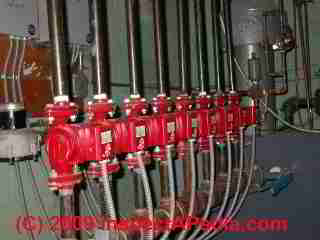 Multiple Circulating Pumps vs Multiple Zone Valves
Multiple Circulating Pumps vs Multiple Zone Valves
Pros & Cons of controlling multiple hot water heating zones by individual circulators or by zone valves
- POST a QUESTION or COMMENT about how to r
Approaches to multiple heating zone control for hydronic (hot water) heating systems:
Heating zone circulator pumps versus heating zone valves: which approach is better for controlling multiple heating zones in buildings?
This article series describes how to diagnose & fix circulator pump problems on hot water or hydronic heating systems.
InspectAPedia tolerates no conflicts of interest. We have no relationship with advertisers, products, or services discussed at this website.
- Daniel Friedman, Publisher/Editor/Author - See WHO ARE WE?
Which is better: heating control using zone valves or heating control using individual circulators?
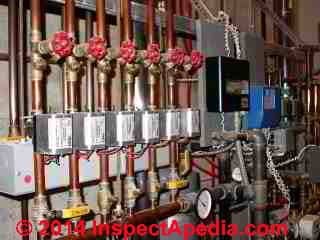 Heating circulator pumps or "zone circulators" are used to force hot water from the heating boiler through radianting devices such as hot water baseboards or radiators. The circulator is switched on as needed or in some designs may be wired to run continuously.
Heating circulator pumps or "zone circulators" are used to force hot water from the heating boiler through radianting devices such as hot water baseboards or radiators. The circulator is switched on as needed or in some designs may be wired to run continuously.
[Click to enlarge any image]
Here we discuss the alternative methods of multiple heating zone control, choosing between using individual heating zone controls typically all serviced by a single circulator pump and controlling zones with zone valves (photo at left) and using individual circulator pumps, one for each zone.
Each approach has its advantages and dis-advantages. I remain unconvinced that either approach is always the "only" right answer to the heating needs of a building
Our photo at left illustrates the use of multiple zone control valves to manage multiple heating zones in a building.
Arguing whether multiple circulator pumps (photo below) or multiple zone valves is a better approach to heating zone control is like arguing religion. Some heating contractors prefer using individual circulator pumps, one per zone, perhaps because they recall the history of unreliable zone valves which tended to clog or jam in some models by some manufacturers.
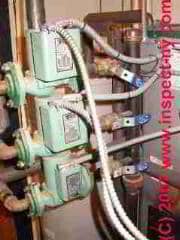 The "zone valve" gang retort that
modern heating zone valves are as reliable or more reliable than [some models of] heating circulator pumps and that a zone
valve costs a lot less. And adding zone control to an existing heating system may be less costly by adding a zone valve than by adding a circulator pump.
The "zone valve" gang retort that
modern heating zone valves are as reliable or more reliable than [some models of] heating circulator pumps and that a zone
valve costs a lot less. And adding zone control to an existing heating system may be less costly by adding a zone valve than by adding a circulator pump.
The fans of heating zone valves argue that the valves are easier to install, less expensive, and require less maintenance than individual circulator pumps. You'll read below that not everyone agrees with this view.
Those less enchanted by zone valves argue that zone valves jam, stick, don't work reliably and are thus annoying. In my experience, older zone valves that I encountered in the 1970's and 1980's were often a budget model that did not perform well and were not long lasting. But modern zone valves have in my experienced proven reliable and easy to repair.
The disenchanted also point to pumping capacity or flow rates possible with multiple circulators or variable speed circulators, and the use of circulators to operate the separate heating "zone" used
with INDIRECT FIRED WATER HEATERS.
Even when multiple circulators are in use to control heating zones in a building it may be easier to use a zone control valve if you decide to split a heating zone into two separate loops or control areas.
Details about how zone valves are installed, wired, and when needed diagnosed and repaired or replaced are given in a separate article found
Question: reader comments on multiple circulators vs. multiple zone valves for heating zone control
(Aug 17, 2012) Barney said:
I have tried both multi pumps and motorised valves and I would like to make a few points.
Firstly, the cost of modern 60-30 or 50-30 pumps are not that much more costly than the more popular motorised valves. When you consider the failure rate of the seemingly most popular Honeywell and their copies (normally cheaper)motorised valves the multi-pump approach is probably cheaper.
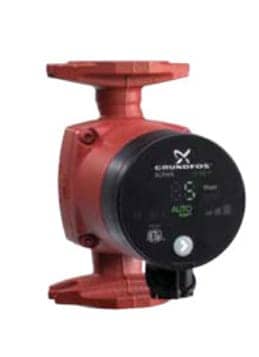 This is because of the Honeywell type design which depends on a synchronous motor running to hold the valve open and eventually the synchronous motor fails. They are not teribly expensive but a hastle to change and if you can't do it yourself it costs a plumber/heating man.
This is because of the Honeywell type design which depends on a synchronous motor running to hold the valve open and eventually the synchronous motor fails. They are not teribly expensive but a hastle to change and if you can't do it yourself it costs a plumber/heating man.
There are better designs such as the Satchwell but are still very expensive. I use Grundfos pumps and in particular the Alpha 2 model.
It is surpurb.
My system uses 5 Alpha 2's 60-30 pumps where I have removed all the motorized valves. I have bought some on mine on Ebay which are new and work fine.
[Image at left, Grundfos alpha series variable speed circulator pump - Click to enlarge]
Another point, many heating engineers are full of s--t in saying you have to use a larger pump on large systems. I have talked to Grunfos technical people and as long as the pump is able to meet the water volume load the smaller pumps are fine.
I use the Alpha 2 rather than the Alpha 2L pump becaause of the display showing the Load being taken in Watts. My circuits are running at between 9 and 12 watts which over a period of time represents considerable savings in electricity over the lower cost and more older 35 watt cheaper traditional model.
A couple more points to answer some of the comments made and questions.
No, you do not have to use a relay as most if not all 230 volt thermostats can cope with the small current requirements including startup currents of most modern pums like the Alpha 2.
Anonymous is wondering about water backing up into the other zones. I wondered also and installed at the end of each loop a non-return valve. Very simple device and very cheap from BES in the U.K. Hope this helps somebody!
How do we control hot water flow when using multiple circulator pumps?
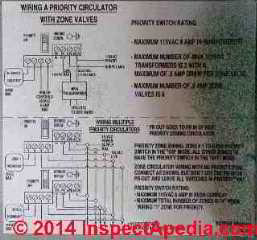 How do we make sure hot water only enters the zone calling for heat?
How do we make sure hot water only enters the zone calling for heat?
July 3, 2012) Anonymous said:
When using pumps for zoning,what stops the water from enterning the other zones
Reply:
Anon: the flow-control valve, a check valve usually found at the boiler hot water riser pipe(s), prevents water from circulating through zone piping until the circulator for that zone begins to spin - causing a more significant pressure difference across the zone.
[Click to enlarge any image]
See CHECK VALVES, HEATING SYSTEM for details about flow control valves.
...
Reader Comments, Questions & Answers About The Article Above
Below you will find questions and answers previously posted on this page at its page bottom reader comment box.
Reader Q&A - also see RECOMMENDED ARTICLES & FAQs
On 2021-02-06 by Anonymous
Thank for your time and advice just the same.
On 2021-02-03 by - by (mod) -
friedman (mod)Richard:
Most likely your installer simply needs to add another circulator relay that is switched by the thermostat and that is in turn wired out also to the boiler aquastat. It'd duplicate wiring already in place. Perhaps there's something we are missing here.
After decades of field investigation and forensic lab work, with exception of a few pro-bono or research assignments, I have retired from field work and also from forensic laboratory analysis work to concentrate full time on pure research and writing for InspectApedia.com.
I must send my regrets that our workload as well as the urgency of your situation preclude telephone, in-person, and any lengthy email consulting, whether pro-bono or paid, concerning the question(s) that you have raised.
It's also the case that far more reliable, safer guidance will come from having an on-site expert discuss your concerns, take a thorough case and building history, inspect the building exterior, interior, mechanical systems thoroughly if that's required, perhaps provide a bit of ancillary testing (never rely on tests alone), provide findings in writing, and answer your follow-up questions.
For environment and health related worries it's usually best to start with guidance from your own doctor.
In five decades of building, environmental, and forensic work it has been my experience that at every case in which I was able to actually visit and inspect a property there were critical observations and conditions that simply were not obvious to a normal home owner, buyer, realtor. It's not that the inspector is necessarily smarter, but rather that they have different experience.
E-text, reports, photos, phone calls are never a substitute for an on-site expert.
CONSULTANTS & EXPERTS DIRECTORIES - at https://inspectapedia.com/Expert-Consultants-Directory.php may be of some help to you.
InspectAPedia.com provides building and environmental diagnostic and repair information. Many basic questions you may have can find a better-organized and more-complete written answer at our website than we can provide with a new off-the-cuff reply.
Try the on-page search-box found at the top or bottom of any of our website pages.
On 2021-02-03 by Richard A Leto
Hi,
I’m adding a new zone for a finished basement. I have a hot water heating system that presently has 4 zones:1st floor,2nd floor and 2 radiant heat zones. The plumber has installed the new circulator and the thermostat is in place. Neither the plumber or electrician seem to know how to wire it all to the boiler. I’m a retired building engineer and would like to take it on. Could you offer assistance if I send you photos?
On 2020-11-01 by - by (mod) -
friedman (mod)Thanks Mark, that feedback will help other readers.
Keep me posted, and stay warm,
hope you voted AND that our votes get counted.
On 2020-11-01 by Mark
@ - by (mod) -
friedman, thanks much for your reply. When I went to jump the terminals, I realized I could quickly check both the suspect lever and the power head at the same time by just swapping power heads. Sure enough, the end problem followed the head, so the lever is good and theromstat is functioning properly. I'm starting with replacing the head. If that doesn't do it, I'll swap in a temporary circulator to check it, too. Thanks again.On 2020-10-31 by - by (mod) -
friedman (mod)If the zone valve is open and the circulator is working water should flow through the zone;
IF it does not, beyond being air-bound (that can be subtle to find all air blockages), the circulator impeller could be damaged so even if the circ motor runs it may not be pushing water,
OR
The zone valve lever may make us think the valve is open but it could be actually shut in the valve itself (uncommon)
If problem were one of low pressure in the hydronic system you ought to see that on the pressure gauge; for a residential system at typical house height, the COLD pressure in the system is 12 psi and it
goes up to under 30 psi when hot.
You can check zone valve wiring by eliminating the thermostat from the equation - remove those wires and jump those terminals at the zone valve and watch to see if it actuates the motor and opens the valve. When the valve is fully open the end switch on the valve closes between the valve's other two wires that turn on the circulator.
On 2020-10-31 by Mark
I have a 4 legs coming off my boiler, each with a separate circulating pump.
3 of them control a single zone.
The 4th leg splits and has a pair of Taco zone valves.
Everything was fine until late spring this year, when part of one stopped heating.
Then COVID, turned off everything, and promptly forgot about all if it until this week when I needed to fire up the boiler to keep the kids warm.
One of "zone valve" legs isn't running water or getting hot. The other seems fine.
I have flushed out air and am confident it isn't an air issue, no valve issues at the other end.
If I manually pull the lever on the suspect Taco valve, water seems to flow but never shuts off and leaves the circulating pump running 24/7.
Is this actually a zone valve issue? Or a pump with too low pressure? Or wiring to the zone valve?
Thanks for any ideas
On 2020-02-16 by - by (mod) -
friedman (mod)In the ARTICLE INDEX take a look at the diagnostics for
AIRBOUND HEATING SYSTEM
On 2020-02-15 by Tony
I have a boiler System in my house. Two zones.the back part of my house is heating up the front part of my house is not. Can somebody tell me why
On 2019-11-02 by - by (mod) -
friedman (mod)Alan
Start by checking the position of the control knob atop the check valves; those valves, detailed at
CHECK VALVES, HEATING SYSTEM https://inspectapedia.com/heat/Check_Valves_Heat.php
also called Flo Control Valves (by some brands) have both an internal check valve that prevents un-wanted hot water flow (by convection) until there is a pressure differential in the piping caused by the turn-on of the circulator pump; but if the knob at the top of the valve is in the wrong position the valve could be left stuck wide open.
Also post a photo of your boiler showing the circulators and check valves (one photo per comment) and I may be able to comment further.
On 2019-11-02 by Alan
I installed a three pump controlled system with check valves in pumps and when one zone activates I get flow through all three but more flow on the zone with pump that is suppose to be heating what can I do to isolate the three zones so no bleed over to other zones accuring?
On 2019-11-02 by (mod) - why do I get heating water flowing through zones that are OFF ?
Alan
Start by checking the position of the control knob atop the check valves; those valves, detailed at
CHECK VALVES, HEATING SYSTEM
also called Flo Control Valves (by some brands) have both an internal check valve that prevents un-wanted hot water flow (by convection) until there is a pressure differential in the piping caused by the turn-on of the circulator pump; but if the knob at the top of the valve is in the wrong position the valve could be left stuck wide open.
Also post a photo of your boiler showing the circulators and check valves (one photo per comment) and I may be able to comment further.
On 2019-11-02 by Alan
I installed a three pump controlled system with check valves in pumps and when one zone activates I get flow through all three but more flow on the zone with pump that is suppose to be heating what can I do to isolate the three zones so no bleed over to other zones accuring?
On 2019-10-13 by Chad
Does anyone make a 4 or 5 pump controller with multable pump outlets on each zone, that has the ability to control mutible pumps on each zone that can jump to another zone for that zone as well. With out using multiple RIBs at the pump connections. Like if it had dip switches for the additional pumps on the controller for each zone. Thanks
On 2018-01-24 by (mod) -
Andy
Typically a circulator is indeed sized to handle the case of all heating zones calling for heat at the same time.
Once you've got hot water from the boiler circulating through a zone, the main difference in time to warm that zone will be the zone size and the zone area's rate of heat loss. Upping boiler temperature, increasing water flow rate, and other tricks can improve the heat delivery rate somewhat.
Other choices are available but are more trouble:
1. install baseboards rated for a higher BTUh output per linear foot
2. install larger diameter piping if your plumber, like our very disappointing one in Pougheepsie, saved a dime on the installation by using 1/2" rather than the usual 3/4" diameter heating supply piping.
3. install a variable speed or higher speed circulator
4. Find and fix points of heat loss in the cold zone, starting with drafts
Keep in mind that the zones will not be equal in size, heat loss, or other parameters - just as your case describes.
However since each zone is individually regulated by a thermostat and in your case zone valve, that means in essence that the colder zone should simply call for heat longer until satisfied.
You can play with zone balancing by closing the outlet louvers on the shorter-zone baseboards to handle the case you describe.
Also check that the long zone is actually really finned copper tubing baseboards, not just naked pipe (that has a much lower heat output rate) and check that air flow through the baseboards is not blocked in the long zone.
Just looking at the boiler's BTUh capacity is not enough. Your long zone could be partly air-bound, or there could be some other obstruction in heat outlet.
Adding a "more powerful" circulator will run water faster through all of the zones, thus somewhat increasing the delivery rate of btus to each area.
On 2018-01-24 by Andy
Forgot to put my name - Anonymous is me.
I should add that the below was recently installed (along with a new furnace) by an HVAC company. Previously each of my four zones had it's own circulator. On cold nights with the new setup the heat didn't keep up and the house got progressively colder, which it did not do previously. The HVAC company says it's not the furnace because the new one has more BTU. They are coming to replace the circulator with a more powerful one, but I am trying to understand how the one circulator can properly serve the four zones. Thanks
I have four heating zones, one circulator and four zone valves. First question: Say each zone is 3 gpm. If the pump is sized for times when all four zones are calling for heat - say 12 gpm - won't that cause a problem, like noisy pipes, when only one or two zones are calling for heat? Second question: Three of the zones are roughly the same head, but one of the zones is much longer and has at least twice the head of the other three. Won't this zone suffer when it calls for heat at the same time as the other zones?
On 2017-08-14 by (mod) -
Jas
I want to help but I'm confused by the question. Are the zone valves two different brands and models? That can sometimes cause confusion in wiring. Otherwise wiring is pretty standard. Details about how zone valves are installed, wired, and when needed diagnosed and repaired or replaced are given in a separate article found
On 2017-08-13 by Jas
Hi I got six zones and 3 circulation pumps divided each 2 zones, the problem is pump link with 2 zones so when one zone open live reverse , and second zone valve is open automatically
How can I wired the sistem,any relay is good or which type?
On 2017-05-17 by (mod) -
Jae,
I think you want a heating system installer or technician to take a look at the piping of your existing hot water heating system.Typically we can split off a sub loop of an existing zone and install a separate thermostat for the loop.
On 2017-05-17 by Jae
Just added three hydronic radiators to the basement. I find my basement too cold and main floor is warm. Problem is I only have one thermostat on the main floor to control all heating. What can i do to solve this problem
thx
On 2016-12-1 by Bob
having 3 heating areas(thermostats) with their own circulators I'm concerned about how the boiler will respond with the possible combinations of "heat needed" i.e., short cycling - it's a smith oil boiler with high limit only - currently it heats a large tank that the heating areas draw their hot water from
Question: adding zone valves and sub-zones on a hot water heat system
(July 16, 2012) kenny said:
if i decide to add a zone valve to my boiler do i have to hook it up to the relay on the boiler
Reply:
In this installation a thermostat operates the zone valve on a call for heat, causing the zone valve to open to allow hot water to flow thorugh that zone piping loop. Then the zone valve's end-switch that closes to turn on the circulator relay.
Kenny - as you'll see in the wiring instructions for your zone valve, the thermostat causes a low voltage motor in the zone valve to OPEN the valve so that hot water can flow into the zone. When the valve is fully open, an "end switch" in turn talks to the circulator relay to tell it to start the boiler's circulator pump.
...
Continue reading at MULTIPLE CIRCULATORS HOW TO HOOK UP or select a topic from the closely-related articles below, or see the complete ARTICLE INDEX.
Or see these
Recommended Articles
- ZONE DAMPERS for warm air heating system zone control.
Suggested citation for this web page
MULTIPLE HEATING ZONE CONTROL at InspectApedia.com - online encyclopedia of building & environmental inspection, testing, diagnosis, repair, & problem prevention advice.
Or see this
INDEX to RELATED ARTICLES: ARTICLE INDEX to HEATING BOILERS
Or use the SEARCH BOX found below to Ask a Question or Search InspectApedia
Ask a Question or Search InspectApedia
Try the search box just below, or if you prefer, post a question or comment in the Comments box below and we will respond promptly.
Search the InspectApedia website
Note: appearance of your Comment below may be delayed: if your comment contains an image, photograph, web link, or text that looks to the software as if it might be a web link, your posting will appear after it has been approved by a moderator. Apologies for the delay.
Only one image can be added per comment but you can post as many comments, and therefore images, as you like.
You will not receive a notification when a response to your question has been posted.
Please bookmark this page to make it easy for you to check back for our response.
IF above you see "Comment Form is loading comments..." then COMMENT BOX - countable.ca / bawkbox.com IS NOT WORKING.
In any case you are welcome to send an email directly to us at InspectApedia.com at editor@inspectApedia.com
We'll reply to you directly. Please help us help you by noting, in your email, the URL of the InspectApedia page where you wanted to comment.
Citations & References
In addition to any citations in the article above, a full list is available on request.
- "Instruction Manual, Bell & Gossett Series LR Circulators" P86101D, Mayu 2012, Xylem Inc. 8200 N. Austin Avenue Morton Grove, Illinois 60053 Phone: (847) 966-3700 Fax: (847) 965-8379 www.xyleminc.com/brands/bellgossett
- "Installation and Operation Instructions, Raytherm Residential Boilers," courtesy of Raypak®, and technical advisor Wayne Hoffman, personal communication 5/11/2009. Mr. Hoffman is a technical advisor with more than 30 years experience in the heating field. Raypak is a Rheem company that provides hydronic heating boilers for residential, pool, and commercial use. Raypak can be contacted at 866-583-0664 for technical support or for assistance in selecting the proper heating equipment for a specific application. Rheem Corporation is a manufacturer of water heaters and heating equipment including Ruud heating and cooling products.
- Bell & Gossett Air Separators and other heating system components, 8200 N. Austin Ave., Morton Grove IL 60053, USA - Tel 847 966-3700 Fax 847 965-8379 . Air separators are discussed by B&G at http://www.bellgossett.com/homeowners/BG-airseparator.asp
- Taco air scoops and other heating system components & controls: Taco Inc., 1160 Cranston Street, Cranston, RI 02920 / (401) 942-8000 / Fax (401) 942-2360 Taco (Canada) Ltd., 6180 Ordan Drive, Mississauga, Ontario L5T 2B3 / (905) 564-9422 / Fax (905) 564-9436 www.taco-hvac.com
Taco also has some helpful FAQs that are useful in diagnosing circulator problems - see http://www.taco-hvac.com/en/faq.html# - Sparco air purgers, air scoops, and other heating system components & controls:
- "Residential Hydronic (circulating hot water) Heating Systems", Instructional Technologies Institute, Inc., 145 "D" Grassy Plain St., Bethel, CT 06801 800/227-1663 [home inspection training material] 1987
- Boilers, Boiler Conversions, James E. Brumbaugh, ISBN 0-672-23389-4 (v. 1) Volume II, Oil, Gas, and Coal Burners, Controls, Ducts, Piping, Valves, James E. Brumbaugh, ISBN 0-672-23390-7 (v. 2) Volume III, Radiant Heating, Water Heaters, Ventilation, Air Conditioning, Heat Pumps, Air Cleaners, James E. Brumbaugh, ISBN 0-672-23383-5 (v. 3) or ISBN 0-672-23380-0 (set) Special Sales Director, Macmillan Publishing Co., 866 Third Ave., New York, NY 10022. Macmillan Publishing Co., NY
- Installation Guide for Residential Hydronic Heating Systems
- Installation Guide #200, The Hydronics Institute, 35 Russo Place, Berkeley Heights, NJ 07922
- In addition to citations & references found in this article, see the research citations given at the end of the related articles found at our suggested
CONTINUE READING or RECOMMENDED ARTICLES.
- Carson, Dunlop & Associates Ltd., 120 Carlton Street Suite 407, Toronto ON M5A 4K2. Tel: (416) 964-9415 1-800-268-7070 Email: info@carsondunlop.com. Alan Carson is a past president of ASHI, the American Society of Home Inspectors.
Thanks to Alan Carson and Bob Dunlop, for permission for InspectAPedia to use text excerpts from The HOME REFERENCE BOOK - the Encyclopedia of Homes and to use illustrations from The ILLUSTRATED HOME .
Carson Dunlop Associates provides extensive home inspection education and report writing material. In gratitude we provide links to tsome Carson Dunlop Associates products and services.

